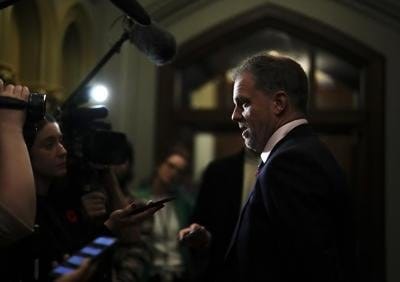Welcome to the latest edition of The Weekly Dose.
This week, we’re looking into the mystery of child-pneumonia epidemics bubbling up in China and other countries, busting up some pandemic misinformation, throwing in a dash of health policy (as always) and adding just a pinch of hospital governance controversy. Join me today as we unravel these issues and go beyond the headlines.
Pharmacare in a tight fiscal future
The federal government's fall economic statement suggests a constrained budget for new programs like pharmacare. While the Liberals and NDP continue to work towards an agreement on legislation, challenges persist amid fiscal restraints.
Why it's important: Financial constraints and political dynamics are making it difficult to implement a universal pharmacare program, raising questions about feasibility and timelines.
The recent update indicates minimal fiscal room for new programs until at least 2027, and is raising concerns on the NDP side about the government's commitment to a universal, single-payer drug program. The negotiations have been complicated by the government's pledge to keep deficits low and the estimated public sector cost of $11.2 billion for a fully implemented pharmacare program next year.
What’s likely to result here is a legislative framework for a federal pharmacare program without immediate funding, rather than an implementation-ready program.
Read more…
Misconceptions about ‘Immunity Debt’
Though the concept of 'immunity debt' continues to be prominently featured in health reporting, experts say it misconstrues the nature of individual immunity, leading to misconceptions among the public and policymakers alike.
Why it's important: The notion of ‘immunity debt’ is scientifically unsupported and risks promoting harmful ideas about infection and population disease management, particularly in children.
The resurgence of RSV as well as worldwide outbreaks of mycoplasma pneumoniae, has reignited discussions around 'immunity debt.' The theory suggests pandemic measures like lockdowns have left children more susceptible to infections due to reduced exposure to pathogens. Immunology experts strongly refute this notion, arguing that avoiding infections doesn't harm individual immunity; in fact, it’s beneficial, especially for infants. They also note that continuous exposure to pathogens often leads to immune system degradation over time.
The immunity debt narrative, while aligning with a sort of “folk understanding” of immunology, undermines efforts to protect population health, especially in the context of future epidemics or a pandemic.
Read more…
Mycoplasma: a growing pediatric health concern
Mycoplasma pneumoniae is now a major factor in an outbreak of pediatric pneumonia worldwide. This surge in cases is linked to various respiratory viruses but is not yet entirely understood.
Why it's important: The stark global rise in mycoplasma pneumonia, so far noted in China, France and South Korea, is likely to be mirrored in Canada, potentially turning this year’s impending tripledemic into a “tetra-demic.”
The increase in cases, particularly severe among children under five, has garnered international attention. Experts are examining various potential drivers, including the role of COVID in weakening immune defenses and the concept of 'immunity debt' (discussed above). The cyclical nature of mycoplasma infections suggests the current spike could be part of a natural pattern rather than solely a result of reduced exposure during periods of intense pandemic mitigation measures.
As health systems grapple with surges, measures like masking, hand washing, and good antibiotic stewardship are recommended.
Read more…
Alberta's New Deal for nurse practitioners
Alberta introduces a new compensation model enabling NPs to open their own clinics, aiming to increase primary healthcare access across the province.
Why it's important: This initiative could significantly enhance healthcare accessibility but is also raising concerns about the integration and scope of services NPs will provide compared to family doctors.
While the specifics of the payment model are still under development, Premier Smith highlighted the role of NPs in easing system pressures, especially given the high demand for primary care services.
The announcement has drawn mixed reactions. The Alberta Medical Association emphasized the need for more family doctors and warned against creating independent, non-team-based practices. The Alberta NDP suggested it won’t address the immediate primary care crisis. With over 700,000 Albertans currently lacking a family doctor, the urgency here is clear.
Read more…
Controversy and regime change at London Health Sciences Center
In the wake of $470K travel controversy, and a ministry probe into LHSC’s spending practices, CEO Jackie Schleifer Taylor is on leave.
Why it's important: The story reflects broader issues of financial opacity and governance in Canada’s hospitals and health networks, impacting staff morale, retention, health budgets, and public trust.
Schleifer Taylor's tenure, which began in January 2021, has been marred by controversy, including the significant expansion of the senior executive team and executive salaries.
One of London’s notable achievements was the successful integration of services across three teaching hospitals, leading to a highly functional healthcare ecosystem. However, in a yet unexplained and unusual move, Schleifer Taylor dismantled that integration, resulting in significant disruptions and undermining a model of care that was exemplary in its efficiency and cohesiveness.
Read more…
Manitoba makes birth control free, including IUDs
Manitoba announced plans to provide free prescription birth control, fulfilling an NDP campaign promise and prioritizing women's health.
Why it's important: The initiative is an effective policy measure to addresses health equity and affordability, reducing unplanned pregnancies and healthcare costs, particularly in rural areas.
Manitoba is set to become the second Canadian province after British Columbia to implement this policy. Health Minister Uzoma Asagwara emphasized the new government's commitment to making health care a priority, especially in remote regions. The plan, expected to cost $11 million annually, covers various birth control methods, excluding condoms. The policy is seen as a significant step forward in improving health equity, and potentially saving costs in the long term by preventing unplanned pregnancies.
Read more…
As we wrap up today’s edition, I hope the stories and analysis here have added to your understanding of the health landscape in Canada and beyond. Until next week, I encourage you to check in regularly at canadahealthwatch.ca or to download our app to stay abreast of the latest developments and insights.
Yours in health,
Nick Tsergas
National Health News Editor
Canada Healthwatch
nick@canadahealthwatch.ca | canadahealthwatch.ca










We have a wonderful NP as our primary health care provider. We are both well and have simple needs. Unfortunately we moved two years ago and our NP is 4 hours away, but so far we have been able o make it work.